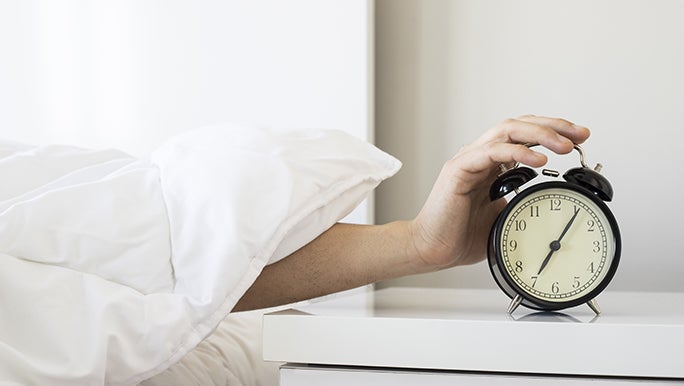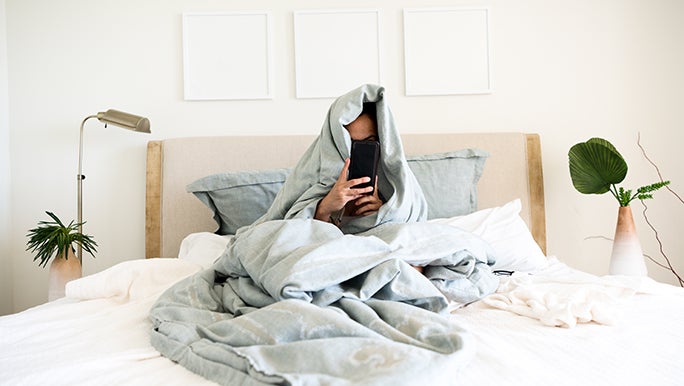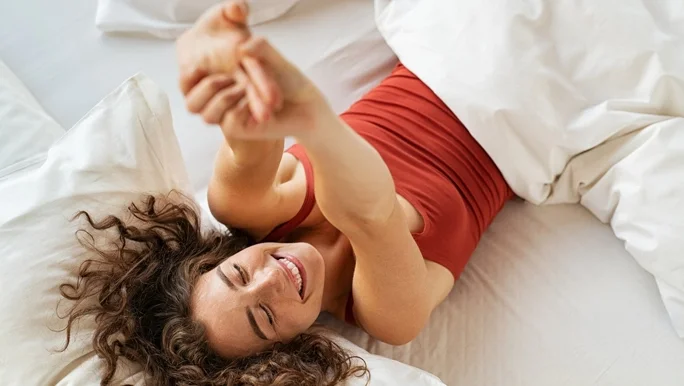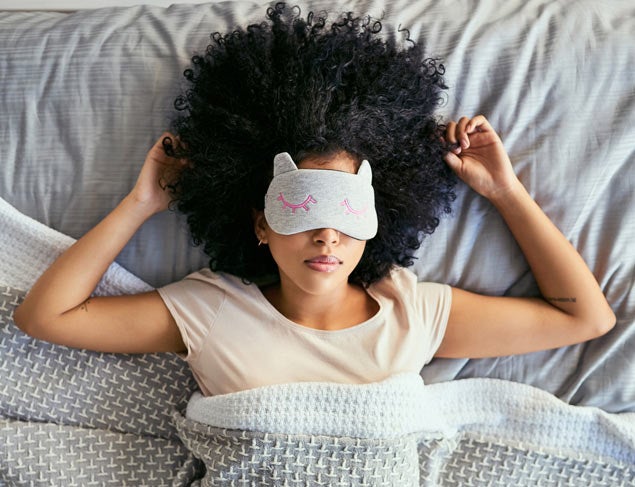Key Points
- For every hour you’re awake, you accumulate a sleep debt that needs to be repaid.
- This debt may accumulate, but it doesn’t need to be paid back on a one-to-one basis.
- The research is undecided when it comes to catching up on missed sleep.
- Lack of sleep has potential health implications.
Burning the candle at both ends? Raising tiny humans? Being tired is your default state? We feel your pain. When you’re exhausted, it’s hard to deal with even the most basic things, let alone everything else.
With so many of us feeling like we could really benefit from catching up on sleep, it’s time we took a closer look at how the whole thing works. We asked Sleep Expert, Dr David Cunnington to answer some popular sleep questions.
What exactly is sleep debt?
Is poor sleep hygiene affecting your sleep?
Here’s some expert advice from sleep specialist Dr David Cunnington about the difference between poor sleep hygiene and good sleep hygiene.
Dr David explains, “Essentially when we are awake, we accumulate a drive for sleep. And that drive for sleep is what's called sleep debt. Think of it as – for every hour we're awake, we'll accumulate a certain amount of sleep debt.”
Dr David acknowledges people think of sleep debt as being bad, but he says sleep debt isn’t always a negative thing – it might be rather important.
“It's a matter of finding the right balance. Not so much we’re really feeling weighed down through the day, but enough so when we go to bed, we can get to sleep and stay asleep through the night,” he says.
But, when you don’t get enough sleep to satisfy your ratio, you could end up in a sleep deficit – owing your body a bit of extra shuteye.
This may lead to grogginess, poor concentration, mood changes and constant yawning, which doesn’t sound ideal when we’re juggling everything life throws at us.

Can you catch up on sleep - studies say maybe.
Does sleep debt accumulate?
The good news about sleep debt is that although it does build up, it doesn’t build up on a one-to-one ratio.
“If you're an hour underslept every night, in three or four years, you're not going to be a thousand hours behind,” Dr David says.
Instead, Dr David believes with a couple of good nights’ sleep, the ‘sins of those last three years’ will be washed away.
Is catching up on sleep a thing?
Although we’ve touched on it above, let’s take a closer look at the big question – can you actually catch up on sleep? And more importantly, can you catch up on sleep over the weekend by binge sleeping?
It’s quite complicated. Studies have offered a similar conclusion – a resounding maybe.
7 sleep aids for a restful night's sleep
Discover our pick of sleep aids to help support better sleep.
But there’s no clear recipe on how to pay your sleep debt.
Dr David believes trying to catch up on sleep by napping or sleeping longer on the weekends is ‘partially restorative’.
“You never really catch up if you have a pattern of missing out on the weekdays and sleeping more on the weekend. But having a nap on the weekend is far better than not having a nap. It probably won’t completely get rid of that accumulated sleep debt that you've got though,” he says.
Instead of asking how to catch up on sleep, just focus on the future
Did you know that an estimated four in every ten Australians are regularly experiencing inadequate sleep?
Dr David suggests instead of asking, “how can I catch up on my sleep?” you try flipping your perspective.
So, rather than searching for sleep hacks and trying to rack up the repay-snooze-hours, ask yourself, “how can I get better sleeping habits?”
Dr David recommends people try:
- practising regular waking times
- examining your sleep hygiene
- ensuring there are adequate opportunities for sleep across your working week
- allowing some wiggle room to make up for the interrupted nights
- trying an afternoon nap (15-30 minutes is optimal)
- talking to your health professional about your concerns.

Did you know that an estimated four in every ten Australians are regularly experiencing inadequate sleep?
Can a lack of sleep impact our health?
There’s a load of research into why sleep is important. And more importantly, what happens if you don’t get enough sleep.
The potential outcomes include:
- reduced alertness
- impacted attention span
- impaired judgement and reaction time
- decreased motivation
- reduced efficiency
- memory decline
- These issues could create knock-on effects on your health and quality of life.
Does everyone need the same amount of sleep?
The Sleep Health Foundation recommends adults have between 7-9 hours of sleep a night.
But people have various sleep requirements, so some people need more – or less – sleep than others. So, if you keep asking yourself why you feel so tired even if you’ve slept for seven hours, your body may just need more sleep.
“For some people, 16 hours awake and eight hours of sleep is perfect – that’s a ratio of two to one. For others, six hours of sleep and 18 hours of being awake is enough. For them, it's a three to one ratio. Everyone has a slightly different ratio,” says Dr David.
It’s great to understand your body’s needs and know your ratio, he adds, because you’re able to make space in your routine for your unique needs.
It’s also a good idea to keep in mind that certain health conditions could cause fatigue, so reach out to your health professional if you have any concerns.

The Sleep Health Foundation recommends adults have between 7-9 hours of sleep a night.
You can’t cheat sleep
Dr David stresses that finding a balance and giving yourself time and space to sleep enough is really important to your health.
“You can't cheat sleep. It’s not as if you could miss out on sleep and not have some consequences from that,” he advises.
So maybe it’s time to reorganise your evenings and make an appointment to catch up on your sleep.
Related:
Dr David Cunnington is a specialist sleep physician who helps his clients to treat their complex sleep problems while also promoting sleep health through education, research and advocacy.
Reviewed by the healthylife Advisory Board April 2022.





